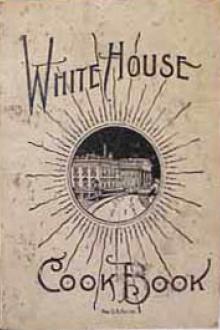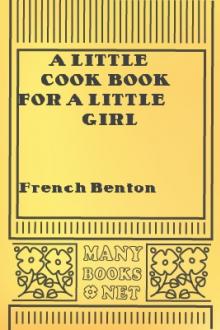The Whitehouse Cookbook (1887), Hugo Ziemann [world of reading .TXT] 📗

- Author: Hugo Ziemann
- Performer: -
Book online «The Whitehouse Cookbook (1887), Hugo Ziemann [world of reading .TXT] 📗». Author Hugo Ziemann
BOSTON BROWN BREAD.
One pint of rye flour, one quart of corn meal, one teacupful of Graham flour, all fresh; half a teacupful of molasses or brown sugar, a teaspoonful of salt, and two-thirds of a teacupful of home-made yeast. Mix into as stiff a dough as can be stirred with a spoon, using warm water for wetting. Let it rise several hours, or over night; in the morning, or when light, add a teaspoonful of soda dissolved in a spoonful of warm water; beat it well and turn it into well-greased, deep bread-pans, and let it rise again. Bake in a moderate oven from three to four hours.
BOSTON BROWN BREAD. (Unfermented.)
One cupful of rye flour, two cupfuls of corn meal, one cupful of white flour, half a teacupful of molasses or sugar, a teaspoonful of salt. Stir all together thoroughly, and wet up with sour milk; then add a level teaspoonful of soda dissolved in a tablespoonful of water. The same can be made of sweet milk by substituting baking powder for soda. The batter to be stirred as thick as can be with a spoon, and turned into well-greased pans.
VIRGINIA BROWN BREAD.
One pint of corn meal; pour over enough boiling water to thoroughly scald it; when cool add one pint of light, white bread sponge, mix well together, add one cupful of molasses, and Graham flour enough to mold; this will make two loaves; when light, bake in a moderate oven one and a half hours.
RHODE ISLAND BROWN BREAD.
Two and one-half cupfuls of corn meal, one and one-half cupfuls of rye meal, one egg, one cup of molasses, two teaspoonfuls of cream of tartar, one teaspoonful of soda, a little salt and one quart of milk. Bake in a covered dish, either earthen or iron, in a moderately hot oven three hours.
STEAMED BROWN BREAD.
One cup of white flour, two of Graham flour, two of Indian meal, one teaspoonful of soda, one cup of molasses, three and a half cups of milk, a little salt. Beat well and steam for four hours. This is for sour milk; when sweet milk is used, use baking powder in place of soda.
This is improved by setting it into the oven fifteen minutes after it is slipped from the mold. To be eaten warm with butter. Most excellent.
RYE BREAD.
To a quart of warm water stir as much wheat flour as will make a smooth batter; stir into it half a gill of home-made yeast, and set it in a warm place to rise; this is called setting a sponge; let it be mixed in some vessel which will contain twice the quantity; in the morning, put three pounds and a half of rye flour into a bowl or tray, make a hollow in the centre, pour in the sponge, add a dessertspoonful of salt, and half a small teaspoonful of soda, dissolved in a little water; make the whole into a smooth dough, with as much warm water as may be necessary; knead it well, cover it, and let it set in a warm place for three hours; then knead it again, and make it into two or three loaves; bake in a quick oven one hour, if made in two loaves, or less if the loaves are smaller.
RYE AND CORN BREAD.
One quart of rye meal or rye flour, two quarts of Indian meal, scalded (by placing in a pan and pouring over it just enough boiling water to merely wet it, but not enough to make it into a batter, stirring constantly with a spoon), one-half cup of molasses, two teaspoonfuls salt, one teacup yeast, make it as stiff as can be stirred with a spoon, mixing with warm water and let rise all night. In the morning add a level teaspoonful of soda dissolved in a little water; then put it in a large pan, smooth the top with the hand dipped in cold water; let it stand a short time and bake five or six hours. If put in the oven late in the day, let it remain all night.
Graham may be used instead of rye, and baked as above.
This is similar to the "Rye and Injun" of our grandmothers' days, but that was placed in a kettle, allowed to rise, then placed in a covered iron pan upon the hearth before the fire, with coals heaped upon the lid, to bake all night.
FRENCH BREAD.
Beat together one pint of milk, four tablespoonfuls of melted butter, or half butter and half lard, half a cupful of yeast, one teaspoonful of salt and two eggs. Stir into this two quarts of flour. When this dough is risen, make into two large rolls and bake as any bread. Cut across the top diagonal gashes just before putting into the oven.
TWIST BREAD.
Let the bread be made as directed for wheat bread, then take three pieces as large as a pint bowl each; strew a little flour over the paste-board or table, roll each piece under your hands to twelve inches length, making it smaller in circumference at the ends than in the middle; having rolled the three in this way, take a baking-tin, lay one part on it, joint one end of each of the other two to it, and braid them together the length of the rolls and join the ends by pressing them together; dip a brush in milk and pass it over the top of the loaf; after ten minutes or so, set it in a quick oven and bake for nearly an hour.
NEW ENGLAND CORN CAKE.
One quart of milk, one pint of corn meal, one teacupful of wheat flour, a teaspoonful of salt, two tablespoonfuls of melted butter. Scald the milk and gradually pour it on the meal; when cool add the butter and salt, also a half cup of yeast. Do this at night; in the morning beat thoroughly and add two well-beaten eggs, and a half teaspoonful of soda, dissolved in a spoonful of water. Pour the mixture into buttered deep earthen plates, let it stand fifteen minutes to rise again, then bake from twenty to thirty minutes.
GERMAN BREAD.
One pint of milk well boiled, one teacupful of sugar, two tablespoonfuls of nice lard or butter, two-thirds of a teacupful of baker's yeast. Make a rising with the milk and yeast; when light, mix in the sugar and shortening, with flour enough to make as soft a dough as can be handled. Flour the paste-board well, roll out about one-half inch thick; put this quantity into two large pans; make about a dozen indentures with the finger on the top; put a small piece of butter in each, and sift over the whole one tablespoonful of sugar mixed with one teaspoonful of cinnamon. Let this stand for a second rising; when perfectly light, bake in a quick oven fifteen or twenty minutes.
CORN BREAD.
Two cups of sifted meal, half a cup of flour, two cups of sour milk, two well-beaten eggs, half a cup of molasses or sugar, a teaspoonful of salt, two tablespoonfuls of melted butter. Mix the meal and flour smoothly and gradually with the milk, then the butter, molasses and salt, then the beaten eggs, and lastly dissolve a level teaspoonful of baking soda in a little milk and beat thoroughly altogether. Bake nearly an hour in well-buttered tins, not very shallow. This recipe can be made with sweet milk by using baking powder in place of soda.
VIRGINIA CORN BREAD.
Three cups of white corn meal, one cup of flour, one tablespoonful of sugar, one teaspoonful of salt, two heaping teaspoonfuls of baking powder, one tablespoonful of lard, three cups of milk and three eggs. Sift together the flour, corn meal, sugar, salt and baking powder; rub in the lard cold, add the eggs well beaten and then the milk. Mix into a moderately stiff batter; pour it into well-greased, shallow baking pans (pie-tins are suitable). Bake from thirty to forty minutes.
BOSTON CORN BREAD.
One cup of sweet milk, two of sour milk, two-thirds of a cup of molasses, one of wheat flour, four of corn meal and one teaspoonful of soda; steam for three hours, and brown a few minutes in the oven. The same made of sweet milk and baking powder is equally as good.
INDIAN LOAF CAKE.
Mix a teacupful of powdered white sugar with a quart of rich milk, and cut up in the milk two ounces of butter, adding a saltspoonful of salt. Put this mixture into a covered pan or skillet, and set it on the fire till it is scalding hot. Then take it off, and scald with it as much yellow Indian meal (previously sifted) as will make it of the consistency of thick boiled mush. Beat the whole very hard for a quarter of an hour, and then set it away to cool.
While it is cooling, beat three eggs very light, and stir them gradually into the mixture when it is about as warm as new milk. Add a teacupful of good strong yeast and beat the whole another quarter of an hour, for much of the goodness of this cake depends on its being long and well beaten. Then have ready a tin mold or earthen pan with a pipe in the centre (to diffuse the heat through the middle of the cake). The pan must be very well-buttered as Indian meal is apt to stick. Put in the mixture, cover it and set it in a warm place to rise. It should be light in about four hours. Then bake it two hours in a moderate oven. When done, turn it out with the broad surface downwards and send it to table hot and whole. Cut it into slices and eat it with butter.
This will be found an excellent cake. If wanted for breakfast, mix it and set it to rise the night before. If properly made, standing all night will not injure it. Like all Indian cakes (of which this is one of the best), it should be eaten warm.
JOHNNIE CAKE.
Sift one quart of Indian meal into a pan; make a hole in the middle and pour in a pint of warm water, adding one teaspoonful of salt; with a spoon mix the meal and water gradually into a soft dough; stir it very briskly for a quarter of an hour or more, till it becomes light and spongy; then spread the dough smoothly and evenly on a straight, flat board (a piece of the head of a flour-barrel will serve for this purpose); place the board nearly upright before an open fire and put an iron against the back to support it; bake it well; when done, cut it in squares; send it hot to table, split and buttered.
SPIDER CORN-CAKE.
Beat two eggs and one-fourth cup sugar together. Then add one cup sweet milk and one cup of sour milk in which you have dissolved one teaspoonful soda. Add a teaspoonful of salt. Then mix one and two-thirds cups of granulated corn meal and one-third cup flour with this. Put a spider or skillet on the range and when it is hot melt in two tablespoonfuls of butter. Turn the spider so that the butter can run up on the sides of the





Comments (0)